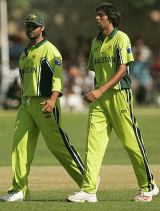
|

Shoaib in full flow, hair flapping, is one of the great sights in the game, and Asif is a seamer of skill and high promise. Cricket needs all the fast bowlers it can get at the moment
© Getty Images
|
|
It's been a depressing start to the Champions Trophy. A qualifying tournament was held to tell us what we already knew, that Sri Lanka are better than West Indies, who are better than Bangladesh or Zimbabwe. The opening game proper, between India and England, was never a real contest. New Zealand v South Africa provided an upset, but not a lot of drama. Low-scoring one-day games are fine, but (like high-scoring ones) they have to be close to exert any grip.
Nothing that has happened on the field has been half as big a story as what has happened off it: Shoaib Akhtar and Mohammad Asif failing drugs tests. In the crazy world of Pakistan cricket, stories have a habit of doing 180-degree turns overnight - no sooner had Younis Khan declined the captaincy than he accepted it again - so this one has to be handled with care, and I very much hope it turns out to be not as bad as it seems. Shoaib in full flow, hair flapping, is one of the great sights in the game, and Asif is a seamer of skill and high promise. Cricket needs all the fast bowlers it can get at the moment.
As things stand, though, it is hard to see the story failing to stand up. The second test has apparently been done, confirming the results of the first (funny how those phrases, so much a part of the game, suddenly mean something else). The banned substance is allegedly
nandrolone
, which has been known to be used by athletes recovering from injury, as both these players recently were. If it's true, this is a misdemeanour on a different scale from Shane Warne taking diuretics to get his weight down. And it's a sad day for cricket. The game has lost a little more of its innocence.
Cricket prides itself on being better than other sports in certain ways. We fans are capable of applauding the other side. We don't beat each other up, whatever the premier of New South Wales may think. Players sometimes give themselves out without waiting for the umpire's finger. Occasionally, they admit that a catch they just claimed wasn't clean. On some of these fronts, cricket is not as clean as it likes to think it is. It has had problems with match-fixing, which is cardinal a sin as you can find within the moral code of sport. And the historians have always been able to show that its reputation for gentlemanliness was partly mythical.
But still, it retains some decency, some sort of ethics, and as we saw in the 2005 Ashes, that can lend it a wonderful resonance. The game has never before had a major drugs scandal. It had seemed to be largely drug-proof: the steroid has not been invented that could help a batsman concentrate for the six hours it takes to make a double hundred, or to enable a spin bowler to bowl with flight and loop and dip. Fast bowling was the one facet of the game where the cartoon muscles of the dubious athlete might come in handy. It would be easier to disbelieve these allegations if they weren't levelled against a couple of quicks.
Asif seems a strange candidate all the same. He is the beanpole type of seamer, not the big bruiser. His game relies on skill and accuracy, not brute force. Shoaib is different with his sprinter's run to the wicket and his upper-body strength. But plenty of fast bowlers down the decades have had those attributes without resorting to artificial help.
The further difference with Shoaib is that he has a rock star's airs, a disdain for the normal way of doing things. It's an attractive quality but also a dangerous one. And it can be self-defeating. It has led him to miss more matches than mere injury can explain: since his debut, nine years ago, he has played 42 Tests, and missed 41. At other times, he has been there but not there, sulking and pouting in the outfield.
The affair casts an interesting light back on the spat between Darrell Hair and Inzamam-ul-Haq. Drug-taking, of course, is one thing, ball-tampering another, but Inzamam's position relied heavily on the idea that it was outrageous that his team should be accused of cheating. In that particular case, it may indeed have been wrong to suggest as much. But his indignation would have been harder to sustain if this story had broken six weeks earlier.
Part of cricket's appeal over the years has been that it hasn't had drug-taking, it hasn't been awash with money, and it has had distinct seasons. Now, the international game is a treadmill, drugs have reared their head, and the money is, by the standards of most supporters, huge. The game will survive, but this week, it has lost a little of its distinctive character.
Tim de Lisle is a former editor of Wisden. His Ashes blog is Ashes Buzz and his website is www.timdelisle.com
